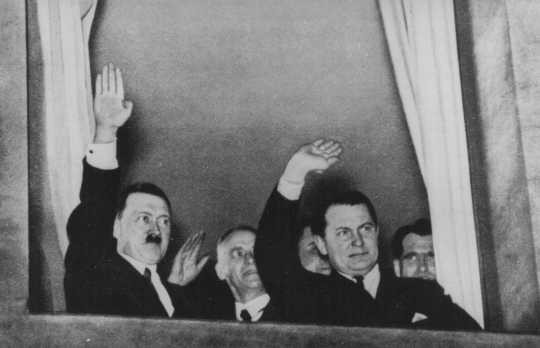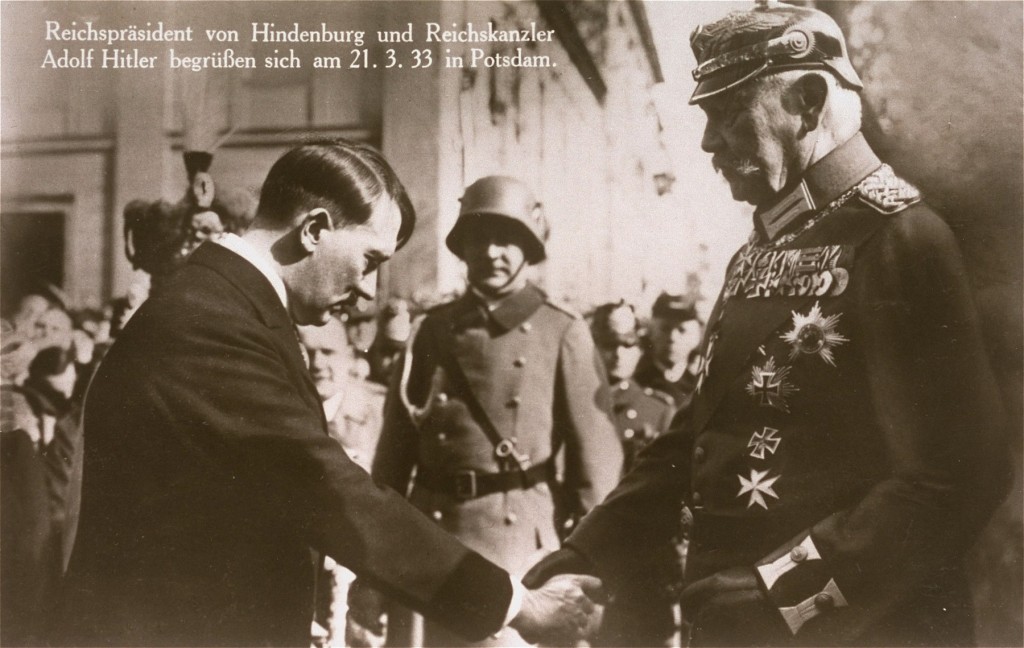
Law on the Head of State of the German Reich
When the Nazis came to power in January 1933, they quickly began transforming Germany from a democracy to a dictatorship. Adolf Hitler and other Nazi leaders used Germany’s existing political and criminal justice systems to accomplish this transformation. The Nazi German regime enacted discriminatory and anti-democratic decrees and laws. And judges created new laws based on judicial decisions (case law). These decrees and laws served Nazi goals. One of these was the Law on the Head of State of the German Reich. It was issued on August 1, 1934.
Key Facts
-
1
Under the German constitution of 1919, Germany had a head of state (the president) and a head of government (the chancellor). Hitler was appointed chancellor in 1933.
-
2
In 1934, the Nazi German regime enacted the Law on the Head of State of the German Reich. This law combined the offices of president and chancellor. It was the final step in granting Hitler full dictatorial power in Germany.
-
3
This law remained in effect until April 30, 1945, when Hitler killed himself.
On January 30, 1933, German President Paul von Hindenburg appointed Nazi Party leader Adolf Hitler as chancellor of Germany. Under the German constitution of 1919, Germany had a head of state (the president) and a head of government (the chancellor). The chancellor was appointed by the president and answered to both the president and the Reichstag (parliament). Of the two positions, the presidency was constitutionally more powerful. However, this changed under Hitler.
Hitler Moves Germany Towards a Dictatorship

As chancellor, Adolf Hitler transformed Germany from a democracy into a dictatorship. In the process, he granted himself enormous power. The Enabling Act (March 1933) gave Hitler as chancellor the power to enact legislation that violated the constitution. But, as long as Hindenburg remained president, Hitler’s dictatorial powers were incomplete.
In spring 1934, it became clear that President von Hindenburg’s health was failing and that he would likely die before the end of the year. Hitler took advantage of this moment. First, he secured the support of German military leaders. At the time, the German military was a highly respected institution that still wielded significant political power in German society. In late June and early July 1934, Hitler ordered the murder of SA leader Ernst Röhm and other SA leaders. Hitler did so in part because military leaders distrusted Röhm who had hoped to replace the professional army with a people’s militia built from the SA. In exchange for the purge, military leaders promised Hitler their future support.
Combining the Offices of President and Chancellor
On August 1, 1934, Reich President von Hindenburg’s death became imminent. Hitler quickly had the Reich Cabinet issue the Law on the Head of State of the German Reich (translated into English below). This law combined the offices of president and chancellor. It granted Hitler the powers of both offices upon Hindenburg’s death. Hitler did this with the support of the German military.
At 9 am on August 2, Hindenburg died. The law of August 1 went into immediate effect. In an announcement to the nation, Hitler argued that the title “Reich President” belonged to Hindenburg for eternity. Consequently, Hitler decreed that he should be called the Führer (leader) and Reich Chancellor. He also announced that a referendum seeking the approval of the German people would be held.
On August 19, 1934, the Nazi regime held the referendum. The referendum asked voters whether they approved of combining the offices of Chancellor and President. It also asked if they approved granting presidential power to Hitler as Führer and Reich Chancellor. About 95% of those eligible voted and about 90% voted to approve Hitler’s actions. The election was neither free nor fair. The regime imposed significant coercion and pressure on its citizens to support the referendum. Still, many Germans did sincerely and enthusiastically support Hitler and the Nazi regime.
The law remained in effect until Hitler’s death on April 30, 1945. Upon the approach of Soviet forces to his bunker in Berlin during World War II, Hitler killed himself.
Translation of Primary Source
(Translated from Reichsgesetzblatt I, 1934, p. 747)
Law on the Head of State of the German Reich of August 1, 1934
The Reich Government has decided the following law which is hereby promulgated:
Section 1
The office of Reich President will be combined with that of the Reich Chancellor. The existing authority of the Reich President shall consequently be transferred to the Führer and Reich Chancellor Adolf Hitler. He shall designate his successor.
Section 2
This law takes effect upon the death of Reich President von Hindenburg.
Berlin, August 1, 1934.
Reich Chancellor Adolf Hitler
Deputy Reich Chancellor von Papen
Reich Minister of Foreign Affairs Freiherr von Neurath
Reich Minister of the Interior Frick
Reich Minister of Finance Graf Schwerin von Krosigk
Reich Minister of Labor Franz Seldte
Reich Minister of Justice Dr. Gürtner
Reich Minister for Defense von Blomberg
Reich Post Minister and Reich Transportation Minister Freiherr von Eltz
Reich Ministry for Nutrition and Agriculture R Walther Darre
Reich Minister for Public Enlightenment and Propaganda Dr. Goebbels
Reich Minister for Air Travel Hermann Göring
Reich Minister of Science, Training and Public Education Bernhard Rust
Minister without Portfolio Rudolf Hess
Minister without Portfolio Hans Kerrl

